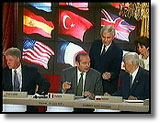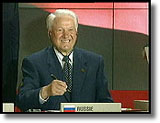
|
Yeltsin Upstages Nato Treaty DealNato heads of government and Russia have signed a historic treaty formally closing the final chapter of Cold War. However, the signature of the new treaty between East and West was dramatically upstaged by the Russian President, Boris Yeltsin, who in a surprise announcement declared that Russia would remove nuclear warheads from missiles aimed at Nato countries. President Yeltsin's remarks surprised everyone, especially his own side. What exactly the President means still remains unclear but his announcement was greeted with warm applause by those present. Speaking through an interpreter, President Yeltsin said, "I have taken a decision today. Everything that is aimed at countries present here, all of those weapons, are going to have their warheads removed." The President's remarks were almost immediately retracted by Russian officials. They explained that what the President actually meant was not the physical removal of the weapons themselves, but rather they would no longer be targeted at Nato countries. But this explanation has so far clarified little as Russia has already signed an agreement in which it promised not to target nuclear missiles at Nato countries who have a nuclear capability. Reacting to Mr Yeltsin's remarks, a senior Nato official said, "If President Yeltsin is signalling the beginning of a new move in the START II (Start Arms Reduction Talks) negotiations then of course we welcome it. But what we really want to see is the destruction of the weapons themselves."
|

|
| Signing the historic pact |
Nato leaders, including American President Bill Clinton and the British Prime Minister Tony Blair signed the Nato and Russia Act in the Elysee Palace in Paris. The agreement paves the way for the expansion of Nato into Hungary, Poland and the Czech Republic, all of whom were once members of the Warsaw Pact.
President Yeltsin has called Nato's decision to expand further into eastern Europe "a strategic mistake". But he did say the signing of the act would ensure that "the negative consequences of Nato's enlargement will be reduced to the minimum".
The treaty falls short of giving the Russians a veto in Nato affairs but it does establish a permanent joint council between Nato and Russia. This new body will provide a channel of communication through which both sides can raise any concerns they may have over security and stability.
Speaking beneath vast chandeliers of the Elysee palace, Tony Blair spoke of a new world in which it was now possible to envisage a generation without experience of war.
He said his father had fought in the "last great European war". The Prime Minister went on "I was born in 1953, a child of the Cold War era, raised amid the constant fear of a conflict with the potential to destroy humanity.
"Whatever other dangers may exist, no such fear exists today. Mine is the first generation able to contemplate the possibility that we may live our entire lives without going to war or sending our children to war. That is a prize beyond value. The gratitude we owe to my father's generation is a debt beyond measure."
Mr Blair continued, "Nato has served my country well. Nato has served Europe well. It must remain the cornerstone of Europe's defence."

|
| Robin Cook: new era of co-operation between East and West |
|
|
| Cook: a "positive" agreement |
| "A wider Nato will not be weaker" |
He said, "I think the agreement is a very positive one. There was a lot of nervousness when the process with Russia and expansion began that Russia would be excluded. I don't think that's the case now."
"I think this signals, if we both use it and make it work, a very positive new relationship between Russia and the West," Mr Cook said.
But the Foreign Secretary sought to allay fears that the move could weaken Nato. "We are quite clear that we don't want to widen Nato if that means weakening Nato," he said, "We are confident as we approach enlargement, if we approach that with caution, if we do it sensibly, there is no question of weakening Nato."
When questioned on the Government's defence review, due to be published on Thursday, Mr Cook said there was "no question" of moving troops forward into Poland or Hungary, or the territory of any new member. This is opening a door to the new European dialogue if we want to take it."
President Clinton, the driving force behind NATO's plans expand into Central and Eastern Europe, commented on the new deal saying, "Nato will come out of it unimpaired and with a good partner in Russia and that's what we want."
The first new members will be designated at a Nato summit July. The leading candidates are Poland, Hungary and the Czech Republic, although Romania and Slovenia also have been mentioned.
Diana, Princess of Wales, 1961-1997
Conference 97
Devolution
The Archive
News |
Issues |
Background |
Parties |
Analysis |
TV/Radio/Web
Interactive |
Forum |
Live |
About This Site
News |
Issues |
Background |
Parties |
Analysis |
TV/Radio/Web
Interactive |
Forum |
Live |
About This Site
© BBC 1997 |
politics97@bbc.co.uk |
